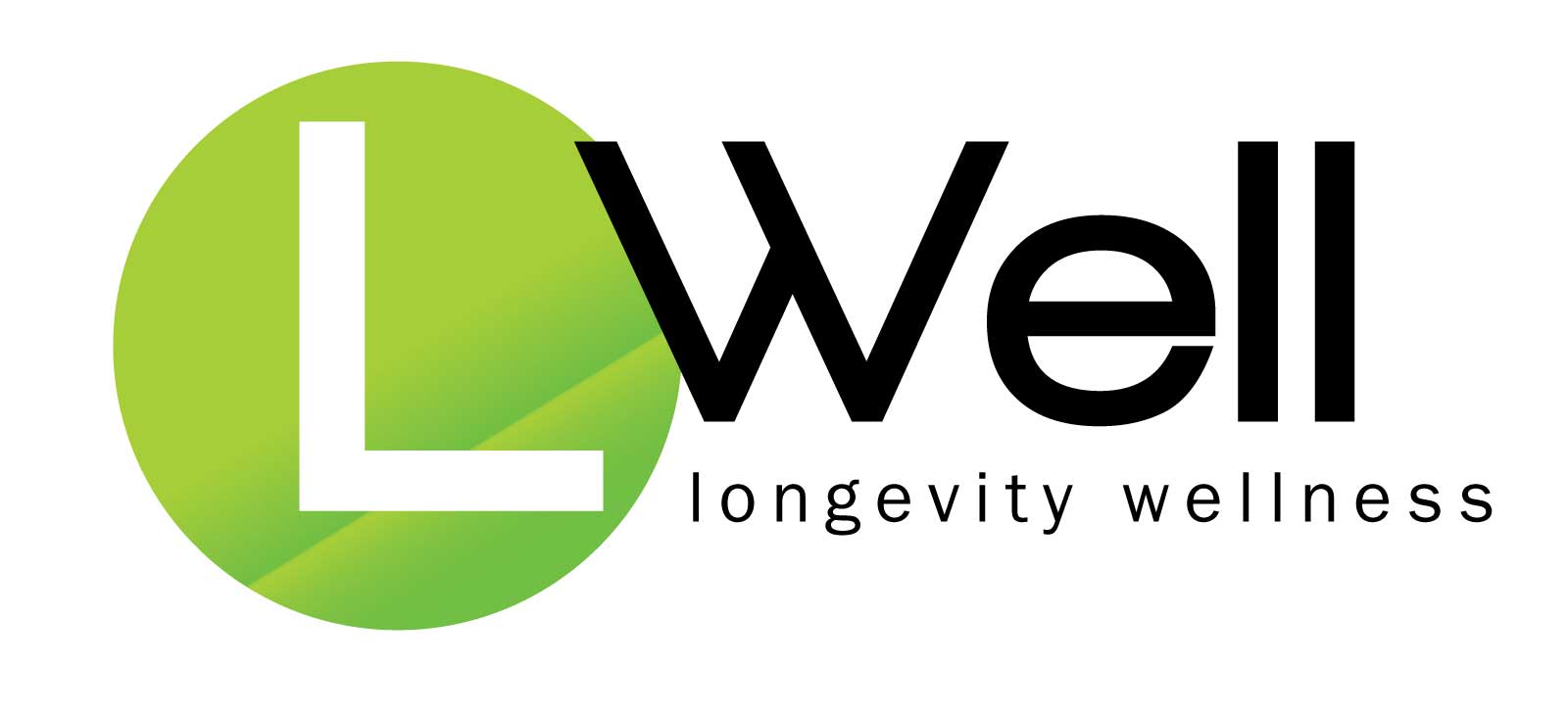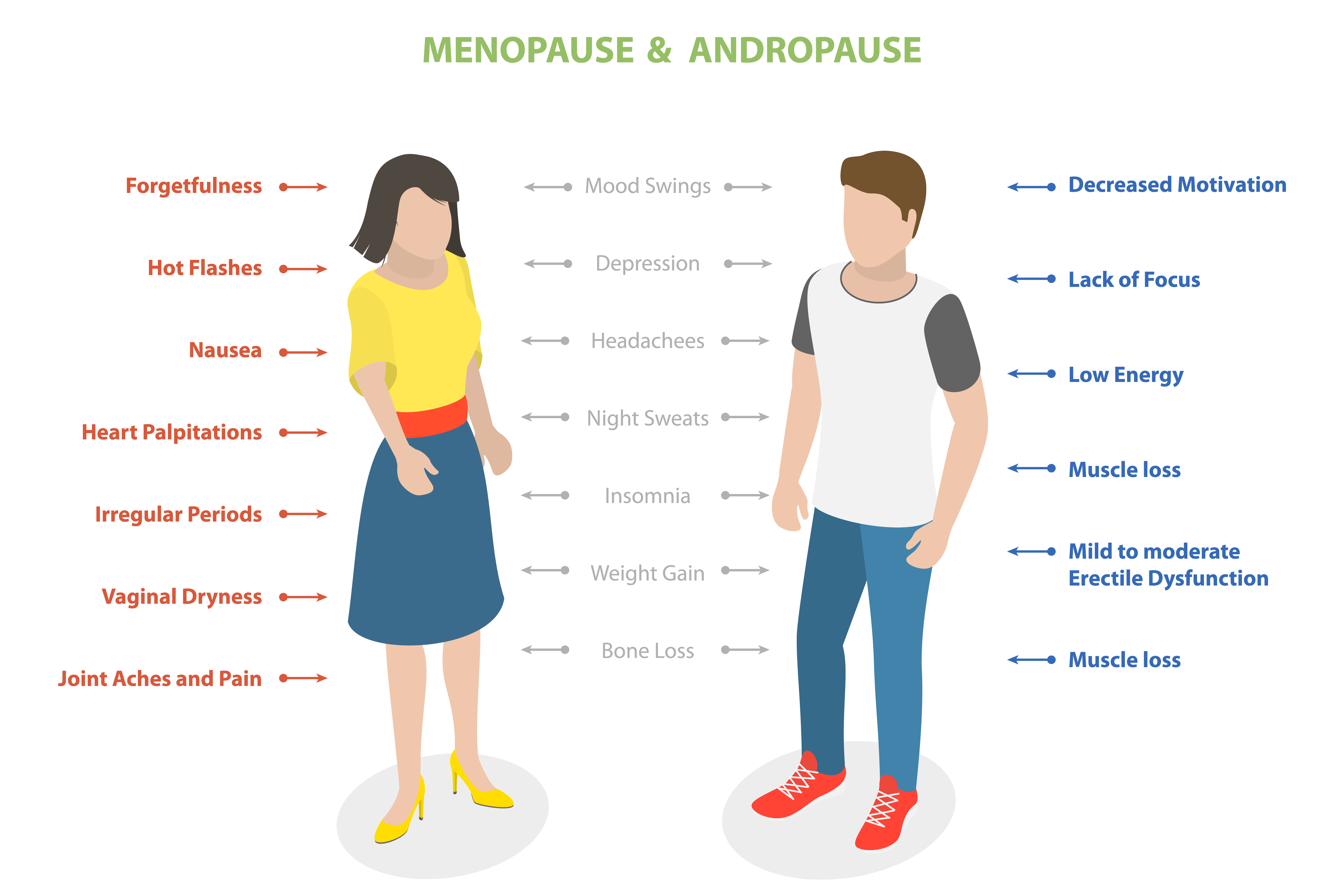Hormonal Imbalances and Weight Gain:
What You Need to Know
As we age, our bodies undergo significant hormonal changes that can impact various aspects of our health, including weight management. Understanding and addressing these hormonal imbalances is essential for maintaining optimal health and well-being. At LWell, we specialize in helping individuals navigate these changes through comprehensive services like nutrition therapy, health coaching, functional medicine, and our dedicated menopause prep course, Calm the Chaos. We also offer the LWell App, which can be used in conjunction with health coaching or as a free version to support your wellness journey. Our expertise empowers both men and women to achieve their health goals and embrace a balanced, healthier lifestyle despite the challenges that come with aging and hormonal shifts.
The Impact of Hormonal Imbalances on Weight Gain
Hormonal imbalances often begin long before menopause, in a phase known as peri-menopause, which can start as early as the mid-30s. During this time, women may experience fluctuating hormone levels that lead to symptoms such as irregular periods, mood swings, and unexplained weight gain. Unfortunately, these early signs are often dismissed by practitioners, leaving many women without the support they need to manage these changes effectively.
For Women:
Menopause marks a significant hormonal transition for women, typically occurring between the ages of 45 and 55 During this time, the body produces less estrogen and progesterone, two hormones that play crucial roles in regulating metabolism, fat distribution, and insulin sensitivity. The decline in these hormones can lead to:
- Increased Abdominal Fat: Lower estrogen levels often result in a shift in fat storage from the hips and thighs to the abdomen, increasing the risk of metabolic syndrome and cardiovascular disease.
- Slower Metabolism: Hormonal changes can cause a decrease in metabolic rate, making it harder to burn calories efficiently.
- Insulin Resistance: Reduced estrogen levels can lead to insulin resistance, which causes the body to store more fat, particularly around the belly.
- Loss of Progesterone: As progesterone levels decline, many women experience difficulty sleeping, increased anxiety, estrogen dominance, and mood swings. These symptoms can further increase the risk of insulin resistance, cardiovascular disease, and metabolic syndrome.
For Men:
Men also experience hormonal changes as they age, particularly a gradual decline in testosterone levels starting as early as their 30s. This decrease, often referred to as andropause, can lead to:
- Increased Body Fat: Lower testosterone levels are associated with increased body fat, especially around the abdomen, and decreased muscle mass.
- Reduced Muscle Mass: Testosterone is crucial for maintaining muscle mass, which plays a key role in metabolism. Less muscle mass can lead to a slower metabolism and easier weight gain.
- Fatigue and Lowered Motivation: Hormonal imbalances can lead to fatigue and decreased motivation for physical activity, further contributing to weight gain.
Addressing Hormonal Imbalances Through Nutrition
While aging and hormonal changes are natural processes, effective management through targeted nutrition can significantly mitigate their impact. LWell’s personalized nutrition therapy and health coaching are designed to address these imbalances, helping you achieve and maintain a healthy weight and overall wellness.
- Prioritize Protein:
- For Women: Incorporating high-quality protein into every meal helps maintain muscle mass and supports a healthy metabolism. Excellent sources include lean meats, fish, eggs, legumes, and plant-based proteins like tofu and tempeh.
- For Men: Adequate protein intake supports muscle repair and growth, counteracting muscle loss associated with declining testosterone levels. Include a variety of proteins such as poultry, fish, lean meats, and plant-based options.
- Embrace Healthy Fats:
- For Women: Healthy fats are essential for hormone production and balance. Foods rich in omega-3 fatty acids, such as salmon, walnuts, and flaxseeds, help reduce inflammation and support cardiovascular health. Avocados, nuts, and olive oil are also excellent choices.
- For Men: Consuming healthy fats can aid in maintaining optimal testosterone levels. Incorporate sources like olive oil, nuts, seeds, and fatty fish into your diet for balanced hormone health.
- Balance Your Carbohydrates:
- For Women: Opt for complex carbohydrates with a low glycemic index, such as whole grains, vegetables, and legumes, to regulate blood sugar levels and prevent insulin resistance.
- For Men: Reducing intake of refined carbohydrates and sugars helps prevent excess fat storage and supports stable energy levels. Focus on fiber-rich carbs like quinoa, brown rice, and a variety of vegetables.
- Incorporate Phytoestrogens and Zinc:
- For Women: Foods containing phytoestrogens, like flaxseeds, soy, and lentils, can help balance estrogen levels naturally. LWell’s “Calm the Chaos” menopause prep course provides in-depth strategies and support for managing menopausal symptoms through diet and lifestyle modifications.
- For Men: Zinc plays a critical role in testosterone production and can be found in foods such as pumpkin seeds, spinach, beef, and chickpeas. Ensuring adequate zinc intake supports hormonal balance and overall health.
- Hydrate and Manage Stress:
- For Both: Staying well-hydrated is vital for all bodily functions, including metabolism and digestion. Additionally, chronic stress can disrupt hormone levels, leading to weight gain and other health issues. LWell’s health coaching includes stress management techniques such as mindfulness, relaxation exercises, and sleep optimization to support hormonal health.
- Leverage the LWell App:
- For Both: The LWell App is an excellent tool for tracking your nutrition, exercise, and wellness goals. It offers features like meal planning, progress tracking, and personalized recommendations. Whether you use the app’s free version or integrate it with our health coaching services, it provides valuable support on your journey to balanced health.
Exercise and Lifestyle Interventions
Adopting an active and balanced lifestyle is crucial in managing hormonal imbalances in conjunction with nutrition.
- Strength Training:
Building and maintaining muscle mass through strength training exercises helps boost metabolism and counteract age-related muscle loss. Activities such as weight lifting, resistance band workouts, and bodyweight exercises should be performed at least two to three times a week. LWell’s health coaches can create customized exercise plans tailored to your needs and fitness level.
- Cardiovascular Exercise:
Regular cardio activities like walking, cycling, swimming, or jogging helps burn calories, improve heart health, and enhance overall endurance. Aim for at least 150 minutes of moderate-intensity cardiovascular exercise each week.
- Stress Management:
Effective stress management is essential for maintaining hormonal balance. Techniques such as yoga, meditation, deep breathing exercises, and ensuring adequate sleep can significantly reduce stress levels. LWell offers guidance and support in incorporating these practices into your daily routine.
- Functional Medicine Assessments:
Understanding your body’s specific needs and deficiencies is key to effective intervention. LWell’s functional medicine services provide comprehensive assessments to identify hormonal imbalances, nutrient deficiencies, and gut health issues. Analyzing your microbiome through comprehensive stool analysis can uncover imbalances affecting your overall health. This personalized approach ensures that dietary, lifestyle, and gut health recommendations are precisely tailored to support your health goals. Whether you’re aware of the importance of gut health but unsure how to address it, or looking to optimize your overall well-being, our expert team at LWell is here to guide you.
- Educational Resources and Support:
Knowledge is power when it comes to managing health changes. LWell provides educational resources and courses, like our “Calm the Chaos” menopause prep course, to equip you with the information and tools needed to navigate hormonal transitions confidently.
Conclusion
Hormonal imbalances can pose significant challenges to weight management and overall health as we age, but with the right strategies and support, these challenges can be effectively addressed. LWell’s comprehensive approach combines personalized nutrition therapy, dedicated health coaching, functional medicine insights, specialized programs, and the support of the LWell App to help you maintain hormonal balance and achieve your health objectives.
Don’t let hormonal changes dictate your quality of life. Contact LWell today to learn how our expert team can support you in achieving balanced hormones and a healthier, more vibrant you. Or, reconnect with your LWell dietitian using our new Directory. Together, we can create a personalized plan that addresses your unique needs and sets you on the path to lasting wellness.
Ready to take control of your health? Contact LWell and start your journey toward balanced hormones and optimal well-being today!
Get on Track
(833) 516-0454
Williamsburg, VA 23185

